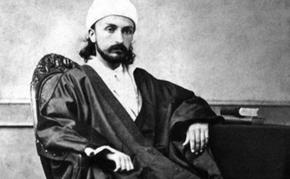The views expressed in our content reflect individual perspectives and do not represent the authoritative views of the Baha'i Faith.
Dethronement of the Earth from the centre of the universe caused profound shock: the Copernican system challenged the entire system of ancient authority and required a complete change in the philosophical conception of the universe. — Britannica Concise Encyclopedia (2007)

Copernicus
The myth that Nicolaus Copernicus (Nikolaj Kopernik) “dethroned” Earth and humanity from the center of the Universe is repeated so often and in such numerous contexts—many in educational spheres—that it has become as reflexive as the assertion that “Columbus discovered America.”
What’s wrong with that? Turns out it’s inaccurate in a number of ways. Dr. Dennis Danielson, author of The First Copernican: Georg Joachim Rheticus and the Rise of the Copernican Revolution, undertakes to enumerate them, referring to the myth as “a perennial mold in our collective mental cupboards.”
The myth goes something like this: Copernicus (a Polish prelate) moved Earth from the central place in the solar system, which:
- demoted the planet,
- dethroned mankind, and
- totally mucked up all religion and religious conceptions of man’s importance because it argues against Biblical (i.e. Jewish and Christian) conceptions of the cosmos.
That’s quite a lot for Copernicus’ slick bit of observation and reasoning to be credited with. The three points above rest on a number of assumptions about reality, such as:
- physical centrality is equivalent to metaphorical, spiritual, or intellectual centrality;
- physical centrality is good;
- physical centrality is essential to human ideas about identity and self-worth because religion promotes anthropocentrism and the hubris of humankind through this concept of centrality;
- religious validity depends upon a literal interpretation of Biblical commentary on the nature of the cosmos (specifically where the planet is in relation to other bodies);
- the Bible teaches literal physical centrality of the Earth.
Got all that?
Danielson comes at these assumptions from a variety of directions, several of which I didn’t even think about because I took the scenery along the way for granted. First, it’s pretty clear that something does not have to be literally in the center of things in order to have importance. I might say that my faith and family occupy a central place in my life or that my writing has a central place in my thoughts. Of course, neither of these things is literally true. The books of scripture that inspire me in a variety of ways, for example, reside in a bookcase in the living room. This room is not physically central in our home. It’s figuratively central in that it’s where we do important things like hold devotions, watch baseball and Dr. Who, rehearse music, and work. It’s where we visit with friends. In other words, it is central intellectually and emotionally without being at all central physically. In fact, when I consider the idea of centrality, I can’t think of an institution in which the physical centrality of a particular building determines the building’s importance. Obviously, physical centrality is not equivalent to importance, so we can tick off point one.
The Baha’i teachings summarize how physical centrality lost its importance in the face of science:
…from the first centuries down to the fifteenth century of the Christian era, all the mathematicians of the world were unanimous in upholding the centrality of the earth and the movement of the sun. This modern astronomer [Copernicus] was the source of the new theory that postulated the movement of the earth and the fixity of the sun. Until his time, all the mathematicians and philosophers of the world held to the Ptolemaic system, and whoever uttered a word against it was considered ignorant… But in the Qur’an a number of verses were revealed which contradicted the Ptolemaic system. One of them, “The sun moves in a fixed place of its own” (Qur’an 36:38), alludes to the fixity of the sun and its movement around an axis.
It was not before the fifteenth century of the Christian era, nearly nine hundred years after Muhammad, that new observations were made by a famous mathematician (Galileo), that the telescope was invented, that important discoveries were made, that the rotation of the earth and the fixity of the sun were proven, and that the latter’s movement about an axis was likewise discovered. Then it became evident that the explicit text of the Qur’an was in full agreement with reality and that the Ptolemaic system was sheer imagination. – Abdu’l-Baha, Some Answered Questions, newly revised edition, pp. 28-29.
Next: How to Distinguish Fact from Metaphor
You May Also Like
Comments

















The message the Pope received from Bahá'u'lláh counsels him to eschew his wealth and to "Sell all the embellished ornaments thou dost possess, and expend them in the path of God . . . abandon thy kingdom unto the kings, and emerge from thy habitation, with thy face set towards the Kingdom, and, detached from the world, then speak forth the praises of thy Lord". He urges him to give up the Papal states, which formed a ...physical barrier between the two parts of the secular kingdom of Italy. In 1870, the Italian government seized the Papal States, leaving only what was within the confines of Vatican City. Pius ended up in self-imposed exile within his palace, refusing to recognize the legitimacy of the Italian government ... or the Cause of Bahá'u'lláh.